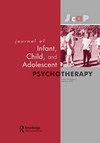Uncovering the Mental World of Children: Attachment Quality, Mental State Talk, and Children’s Drawings
Q3 Psychology
Journal of Infant, Child, and Adolescent Psychotherapy
Pub Date : 2023-11-13
DOI:10.1080/15289168.2023.2272214
引用次数: 0
Abstract
ABSTRACTThe present study utilized archival data to uncover trends associated with children’s drawings, attachment quality, and mental state talk (MST). Two samples of 5–12-year-old children and their caregivers were recruited: one child sample from a public elementary school (n = 54), and the other from consecutive admissions to a child psychiatric inpatient unit (n = 45). Children completed drawings of family, primary caregiver, and self. Drawings were coded using the Formal Elements (FE) and Content rating scales designed to identify selective content and organizational qualities. Attachment quality and MST were obtained using the Attachment Story Completion Task and Children’s Apperception Test. Consistent with the first hypothesis, attachment quality demonstrated a marginally significant positive relationship with Content scores of inpatient children’s family drawings. Consistent with the second hypothesis, attachment quality demonstrated a significant positive relationship with MST in both samples. Consistent with the third hypothesis, MST demonstrated a significant positive relationship with Content scores of nonpatient children’s caregiver drawings, FE scores of nonpatient children’s family drawings, and both Content and FE scores of inpatient children’s family drawings. Drawings hold promise as tools to access children’s internal working models and mental states. Clinical implications are discussed. AcknowledgmentsThe authors wish to acknowledge the following persons for their assistance with coding for this study: Alisa Barsch, Sorrel Johnson, Jenae Richardson, Emily Rispoli, Rachel Ross, Alexandra Tannenbaum, Adama Toure, Theresa Whelan, and Andrea Youniss. The authors acknowledge the guidance and insights of Dr. Valeda Dent in helping to formulate this study. The authors also gratefully acknowledge the cooperation of the children and caregivers who participated in this study.Disclosure statementNo potential conflict of interest was reported by the author(s).Data availability statementDue to patient confidentiality issues, the data will not be made available.Additional informationFundingThis work was supported by the International Psychoanalytical Association Research Advisory Board; Long Island University; Contemporary Freudian Society.Notes on contributorsHolly RosenHolly Rosen, Psy.D., is a postdoctoral fellow at Psychiatry Associates Faculty Group Practice within NYU Langone Medical Center. She received her doctorate degree in Clinical Psychology at Long Island University Post Campus in Brookville, NY in 2023. She completed her predoctoral internship at VA New York Harbor Health Care: Brooklyn Campus. Prior to that, she received outpatient training at Montefiore Medical Center and inpatient training at New York Presbyterian Hospital. Throughout her clinical training, she served as a counselor at Options for Community Living, a transitional living facility for individuals with mental illness and substance abuse disorders. Dr. Rosen is interested in attachment patterns, personality models, and trauma. She served as an instructor for courses about attachment theory and the Enneagram personality model for the Educational Studies Splash Program at Clark University as well as the Spark Program at the Massachusetts Institute of Technology.Geoff GoodmanGeoff Goodman, Ph.D., A.B.P.P., F.I.P.A., is Professor of Psychiatry and Behavioral Sciences in the Emory School of Medicine and Associate Professor of Psychology and Spiritual Care in the Candler School of Theology, Atlanta, GA. He is also Director of New Psychodynamic Programs and Research and Director of the Psychodynamic Research Lab in the Emory University Psychoanalytic Institute (EUPI) and Coordinator of the Society and Personality Concentration in the Candler School of Theology. From 1999 to 2022, Dr. Goodman was Associate Professor of Psychology in the Long Island University (LIU) Clinical Psychology Doctoral Program, New York. He is also a licensed clinical and certified school psychologist with 31 years of experience in private practice in New York and Georgia, treating children and adolescents as well as adults. He is certified in both Clinical Psychology and Psychoanalysis by the American Board of Professional Psychology (ABPP) and is certified as both an adult and a child and adolescent psychoanalyst and Fellow of the International Psychoanalytical Association (FIPA). In 2013, Dr. Goodman was awarded the J. William Fulbright Foreign Scholarship by the US Department of State and spent eight months in 2014 establishing and evaluating a play-based intervention program in two rural village libraries in Uganda.Donna TumanDonna Tuman, Ed.D., recently retired in 2023, was an associate professor at Long Island University Post, where she was chairperson of the Art Department and director of the Art Education Program. From 2003-2009, Dr. Tuman served as president of the University Council for Art Education, a higher education organization working for arts advocacy, and policy change in the schools. She practiced in both public schools and museums while pursuing an Ed.D. in art education from Teachers College, Columbia University. Her research interests include art teacher education, museum-based teacher training, arts advocacy and gender differences in artistic development of children. Her work has been published in Visual Arts Research, Gender Issues in Art Education, Studies in Art Education and The Journal of Aesthetic Education. Her specialties include Art Education, Art Museum Education, Arts Leadership, and Gender Issues in Visual Arts.Deborah OhmDeborah Ohm, Psy.D., earned her doctorate degree in Clinical Psychology at Long Island University Post Campus in 2016. She began working as a clinical psychologist for Columbia Health in 2021. The majority of her clinical training has been in inpatient and outpatient hospital settings and community mental health clinics. Prior to Columbia Health, she was a supervising psychologist at the Mount Sinai Adolescent Health Center, where she helped coordinate the Dialectical Behavior Therapy (DBT) Program for adolescents, young adults, and their families. Dr. Ohm has extensive training and expertise in treating individuals with a wide range of difficulties, including trauma, depression, anxiety, suicidality, intentional self-injury, struggles with identity and sense of self, and difficulties with relationships and family conflict.揭示儿童的心理世界:依恋品质、心理状态谈话与儿童绘画
摘要本研究利用档案数据揭示儿童绘画、依恋质量和心理状态谈话(MST)的相关趋势。研究招募了两个5 - 12岁儿童及其照顾者的样本:一个来自公立小学(n = 54),另一个来自连续入院的儿童精神病住院病房(n = 45)。孩子们完成了家庭、主要照顾者和自我的图画。使用形式元素(FE)和内容评级量表对图纸进行编码,以确定可选择的内容和组织质量。采用依恋故事完成任务和儿童统觉测验获得依恋质量和MST。与第一个假设一致,依恋质量与住院儿童家庭画的内容分数呈显著正相关。与第二个假设一致,依恋质量在两个样本中都与MST呈显著正相关。与第三个假设一致,MST与非患者儿童照顾者画的内容分数、非患者儿童家庭画的FE分数、住院儿童家庭画的内容分数和FE分数均呈显著正相关。绘画有望成为了解儿童内部工作模式和精神状态的工具。讨论了临床意义。作者希望感谢以下人员为本研究提供编码帮助:Alisa Barsch, Sorrel Johnson, Jenae Richardson, Emily Rispoli, Rachel Ross, Alexandra Tannenbaum, Adama Toure, Theresa Whelan和Andrea Youniss。作者感谢Valeda Dent博士在帮助制定本研究中的指导和见解。作者也感谢参与本研究的儿童和照顾者的合作。披露声明作者未报告潜在的利益冲突。数据可用性声明由于患者保密问题,数据将无法提供。本研究得到了国际精神分析协会研究咨询委员会的支持;长岛大学;当代弗洛伊德社会。作者简介:holly Rosen,心理学博士。她是纽约大学朗格尼医学中心精神病学协会的博士后研究员。她于2023年在纽约布鲁克维尔的长岛大学后校区获得临床心理学博士学位。她在弗吉尼亚大学纽约港医疗保健:布鲁克林校区完成了博士前实习。在此之前,她在Montefiore医疗中心接受门诊培训,在纽约长老会医院接受住院培训。在她的临床培训期间,她担任社区生活选择的顾问,这是一个为患有精神疾病和药物滥用障碍的个人提供的过渡性生活设施。罗森博士对依恋模式,人格模型和创伤感兴趣。她曾担任克拉克大学教育研究火花项目和麻省理工学院火花项目的依恋理论和九型人格模型课程的讲师。Geoff Goodman,博士,a.b.p.p., f.i.p.a.,埃默里医学院精神病学和行为科学教授,乔治亚州亚特兰大坎德勒神学院心理学和精神护理副教授。他还是埃默里大学精神分析研究所(EUPI)新心理动力学项目和研究主任、心理动力学研究实验室主任以及坎德勒神学院社会与人格集中协调员。1999年至2022年,古德曼博士在纽约长岛大学(LIU)临床心理学博士项目担任心理学副教授。他也是一名有执照的临床和认证的学校心理学家,在纽约和乔治亚州拥有31年的私人执业经验,治疗儿童和青少年以及成人。他获得了美国专业心理学委员会(ABPP)的临床心理学和精神分析学认证,并获得了成人、儿童和青少年精神分析学认证,同时也是国际精神分析协会(FIPA)的会员。2013年,古德曼博士获得了美国国务院颁发的J. William Fulbright外国奖学金,并于2014年花了8个月的时间在乌干达的两个乡村图书馆建立和评估了一个基于游戏的干预项目。唐娜·图曼,教育学博士。她于2023年退休,曾任长岛大学邮政学院副教授,担任艺术系主任和艺术教育项目主任。从2003年到2009年,博士。 图曼曾担任大学艺术教育委员会主席,这是一个致力于艺术倡导和学校政策改变的高等教育组织。在攻读教育学博士学位期间,她在公立学校和博物馆实习。哥伦比亚大学师范学院艺术教育硕士。她的研究兴趣包括艺术教师教育、博物馆教师培训、艺术倡导和儿童艺术发展中的性别差异。她的作品发表在《视觉艺术研究》、《艺术教育中的性别问题》、《艺术教育研究》和《美育杂志》上。她的研究领域包括艺术教育、美术馆教育、艺术领导力和视觉艺术中的性别问题。Deborah Ohm,心理学博士。她于2016年在长岛大学后校区获得临床心理学博士学位。她于2021年开始在哥伦比亚健康中心担任临床心理学家。她的大部分临床培训是在住院和门诊医院以及社区精神卫生诊所进行的。在哥伦比亚健康之前,她是西奈山青少年健康中心的监督心理学家,在那里她帮助协调青少年,年轻人及其家庭的辩证行为治疗(DBT)计划。Ohm博士在治疗各种各样的困难方面有广泛的培训和专业知识,包括创伤、抑郁、焦虑、自杀、故意自残、与身份和自我意识的斗争,以及与关系和家庭冲突的困难。
本文章由计算机程序翻译,如有差异,请以英文原文为准。
求助全文
约1分钟内获得全文
求助全文
来源期刊

Journal of Infant, Child, and Adolescent Psychotherapy
Psychology-Clinical Psychology
CiteScore
1.70
自引率
0.00%
发文量
37
 求助内容:
求助内容: 应助结果提醒方式:
应助结果提醒方式:


